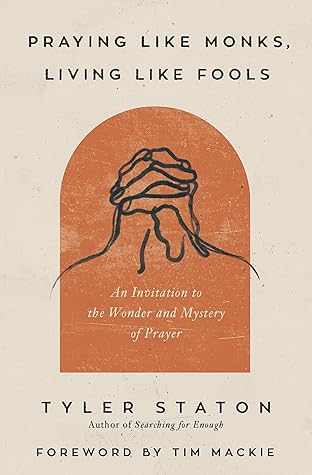More on this book
Community
Kindle Notes & Highlights
by
Tyler Staton
Started reading
February 12, 2025
God is loving enough that a conversation starter is all he needs to draw someone all the way home.
what’s the fruit of that story of self-sufficiency in the life of the modern person? We’re overwhelmed.
Pray Because Trust Comes before Faith We fear silence. But the thing that calms that fear isn’t faith; it’s trust. Faith is the assurance of what we hope for.7 Trust is confidence in the character of God.
Trust allows us to say, “I don’t understand what God is doing right now, but I trust that God is good.”
With trust, we can come to the God whose character doesn’t seem to match his silence, saying with brutal honesty, “Where were you? How could you? What were you thinking?”
some of the psalms are technically heretical. So why would those prayers be included in the Bible? Because they’re honest. That’s what makes these psalms exemplary. God is looking for relationship,
When it comes to prayer, God isn’t grading essays; he’s talking to children.
Most often, when this famous passage is referenced, it starts with the command to rid oneself of anxiety: “Do not be anxious about anything.” But the passage doesn’t start there. Preceding the imperative is a statement of fact: “The Lord is near.”
“The most important discovery you will ever make is the love the Father has for you,” writes Pete Greig, founder of the 24-7 Prayer Movement. “Your power in prayer will flow from the certainty that the One who made you likes you, he is not scowling at you, he is on your side . . . Unless our mission and our acts of mercy, our intercession, petition, confession, and spiritual warfare begin and end in the knowledge of the Father’s love, we will act and pray out of desperation, determination, and duty instead of revelation, expectation, and joy.”
The great scandal and most important work of prayer is simply to let ourselves be loved by God.
There’s a good kind of small, and it comes with wonder at the God who is big enough to fashion the cosmos with his breath and personal enough to take a real interest in the events of my day and the fluctuation of my emotions.
“Solitude is the furnace of transformation,” says Henri Nouwen.
If we really took Jesus’ invitation seriously, if we really believed in the sort of prayer that Jesus talked about, the modern church would have a hard time getting its people to do anything but pray.
Richard Foster writes, “If we truly love people, we will desire for them far more than it is within our power to give them, and this will lead us to prayer.
Human beings were made to be intercessors participating with God in lovingly overseeing the world, set apart, bearing God’s authority to rule in selfless love.
to spread his image into every square inch.
Gratitude is the God-given reward for those who can stomach praying for small things.
“To be a saint is to be fueled by gratitude, nothing more and nothing less . . . Only one kind of person transforms the world spiritually, someone with a grateful heart.”6
The “daily bread” variety of prayers is also a battle cry, a declaration of war against one of the soul’s fiercest enemies—control.
Control is a surface-level symptom of a soul-level desire for fruitfulness.
Jesus teaches us to include the phrase “give us” in our prayers. Daily, as we ask, he weans us off our addiction to independence, our insistence on living under the illusion that what we most deeply desire we can feed ourselves all on our own.
there are two primary reasons for God’s insistence on hearing us say what he already knows we need: relationship and empowerment.
Asking is the means by which we build the relationship with God he designed us to enjoy.
Relationship is God’s end game, but empowerment is his plan for getting there.
God is a relational being to know, not a formula to master.


